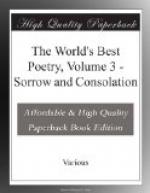Once I was pure as the snows,—but I fell:
Fell, like the snow-flakes, from heaven—to
hell:
Fell, to be tramped as the filth of the street:
Fell, to be scoffed, to be spit on, and beat.
Pleading,
Cursing,
Dreading to die,
Selling my soul to whoever would buy,
Dealing in shame for a morsel of bread,
Hating the living and fearing the dead.
Merciful God! have I fallen so low?
And yet I was once like this beautiful snow!
Once I was fair as the beautiful snow,
With an eye like its crystals, a heart like its glow;
Once I was loved for my innocent grace,—
Flattered and sought for the charm of my face.
Father,
Mother,
Sisters all,
God, and myself, I have lost by my fall.
The veriest wretch that goes shivering by
Will take a wide sweep, lest I wander too nigh;
For all that is on or about me, I know
There is nothing that’s pure but the beautiful
snow.
How strange it should be that this beautiful snow
Should fall on a sinner with nowhere to go!
How strange it would be, when the night comes again,
If the snow and the ice struck my desperate brain!
Fainting,
Freezing,
Dying alone,
Too wicked for prayer, too weak for my moan
To be heard in the crash of the crazy town,
Gone mad in its joy at the snow’s coming down;
To lie and to die in my terrible woe,
With a bed and a shroud of the beautiful snow!
JAMES W. WATSON.
LONDON CHURCHES.
I stood, one Sunday morning,
Before a large church door,
The congregation gathered,
And carriages a score,—
From one out stepped a lady
I oft had seen before.
Her hand was on a prayer-book,
And held a vinaigrette;
The sign of man’s redemption
Clear on the book was set,—
But above the cross there glistened
A golden Coronet.
For her the obsequious beadle
The inner door flung wide;
Lightly, as up a ball-room,
Her footsteps seemed to glide,—
There might be good thoughts in her,
For all her evil pride.
But after her a woman
Peeped wistfully within,
On whose wan face was graven
Life’s hardest discipline,—
The trace of the sad trinity
Of weakness, pain, and sin.
The few free-seats were crowded
Where she could rest and pray;
With her worn garb contrasted
Each side in fair array,—
“God’s house holds no poor sinners,”
She sighed, and crept away.
RICHARD MONCKTON MILNES (LORD HOUGHTON.)
THE BRIDGE OF SIGHS.
“Drowned! drowned!”—HAMLET.
One more unfortunate,
Weary of breath,
Rashly importunate,
Gone to her death!
Take her up tenderly,
Lift her with care!
Fashioned so slenderly,
Young, and so fair!




